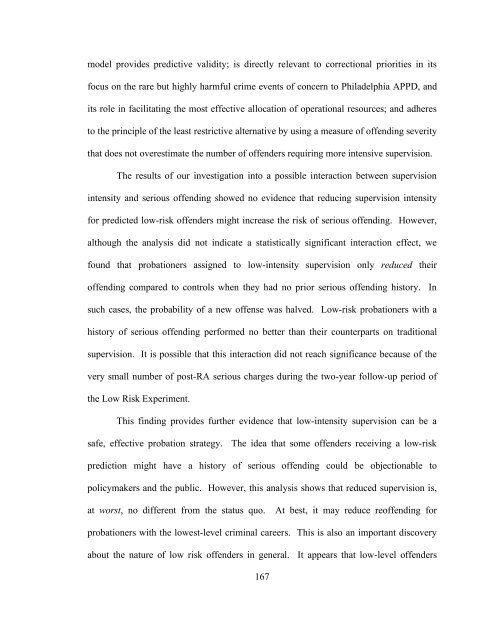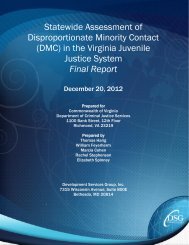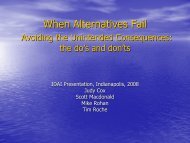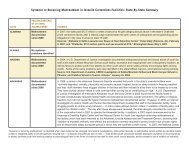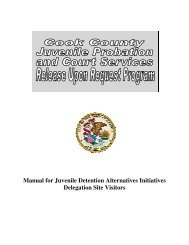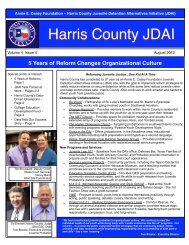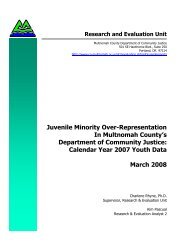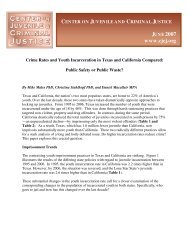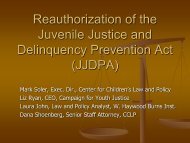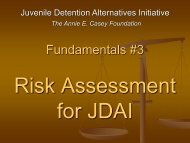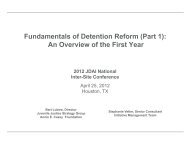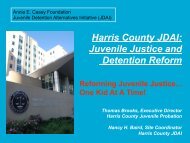The Effects of Sanction Intensity on Criminal Conduct - JDAI Helpdesk
The Effects of Sanction Intensity on Criminal Conduct - JDAI Helpdesk
The Effects of Sanction Intensity on Criminal Conduct - JDAI Helpdesk
You also want an ePaper? Increase the reach of your titles
YUMPU automatically turns print PDFs into web optimized ePapers that Google loves.
model provides predictive validity; is directly relevant to correcti<strong>on</strong>al priorities in its<br />
focus <strong>on</strong> the rare but highly harmful crime events <str<strong>on</strong>g>of</str<strong>on</strong>g> c<strong>on</strong>cern to Philadelphia APPD, and<br />
its role in facilitating the most effective allocati<strong>on</strong> <str<strong>on</strong>g>of</str<strong>on</strong>g> operati<strong>on</strong>al resources; and adheres<br />
to the principle <str<strong>on</strong>g>of</str<strong>on</strong>g> the least restrictive alternative by using a measure <str<strong>on</strong>g>of</str<strong>on</strong>g> <str<strong>on</strong>g>of</str<strong>on</strong>g>fending severity<br />
that does not overestimate the number <str<strong>on</strong>g>of</str<strong>on</strong>g> <str<strong>on</strong>g>of</str<strong>on</strong>g>fenders requiring more intensive supervisi<strong>on</strong>.<br />
<str<strong>on</strong>g>The</str<strong>on</strong>g> results <str<strong>on</strong>g>of</str<strong>on</strong>g> our investigati<strong>on</strong> into a possible interacti<strong>on</strong> between supervisi<strong>on</strong><br />
intensity and serious <str<strong>on</strong>g>of</str<strong>on</strong>g>fending showed no evidence that reducing supervisi<strong>on</strong> intensity<br />
for predicted low-risk <str<strong>on</strong>g>of</str<strong>on</strong>g>fenders might increase the risk <str<strong>on</strong>g>of</str<strong>on</strong>g> serious <str<strong>on</strong>g>of</str<strong>on</strong>g>fending. However,<br />
although the analysis did not indicate a statistically significant interacti<strong>on</strong> effect, we<br />
found that probati<strong>on</strong>ers assigned to low-intensity supervisi<strong>on</strong> <strong>on</strong>ly reduced their<br />
<str<strong>on</strong>g>of</str<strong>on</strong>g>fending compared to c<strong>on</strong>trols when they had no prior serious <str<strong>on</strong>g>of</str<strong>on</strong>g>fending history. In<br />
such cases, the probability <str<strong>on</strong>g>of</str<strong>on</strong>g> a new <str<strong>on</strong>g>of</str<strong>on</strong>g>fense was halved. Low-risk probati<strong>on</strong>ers with a<br />
history <str<strong>on</strong>g>of</str<strong>on</strong>g> serious <str<strong>on</strong>g>of</str<strong>on</strong>g>fending performed no better than their counterparts <strong>on</strong> traditi<strong>on</strong>al<br />
supervisi<strong>on</strong>. It is possible that this interacti<strong>on</strong> did not reach significance because <str<strong>on</strong>g>of</str<strong>on</strong>g> the<br />
very small number <str<strong>on</strong>g>of</str<strong>on</strong>g> post-RA serious charges during the two-year follow-up period <str<strong>on</strong>g>of</str<strong>on</strong>g><br />
the Low Risk Experiment.<br />
This finding provides further evidence that low-intensity supervisi<strong>on</strong> can be a<br />
safe, effective probati<strong>on</strong> strategy. <str<strong>on</strong>g>The</str<strong>on</strong>g> idea that some <str<strong>on</strong>g>of</str<strong>on</strong>g>fenders receiving a low-risk<br />
predicti<strong>on</strong> might have a history <str<strong>on</strong>g>of</str<strong>on</strong>g> serious <str<strong>on</strong>g>of</str<strong>on</strong>g>fending could be objecti<strong>on</strong>able to<br />
policymakers and the public. However, this analysis shows that reduced supervisi<strong>on</strong> is,<br />
at worst, no different from the status quo. At best, it may reduce re<str<strong>on</strong>g>of</str<strong>on</strong>g>fending for<br />
probati<strong>on</strong>ers with the lowest-level criminal careers. This is also an important discovery<br />
about the nature <str<strong>on</strong>g>of</str<strong>on</strong>g> low risk <str<strong>on</strong>g>of</str<strong>on</strong>g>fenders in general. It appears that low-level <str<strong>on</strong>g>of</str<strong>on</strong>g>fenders<br />
167


